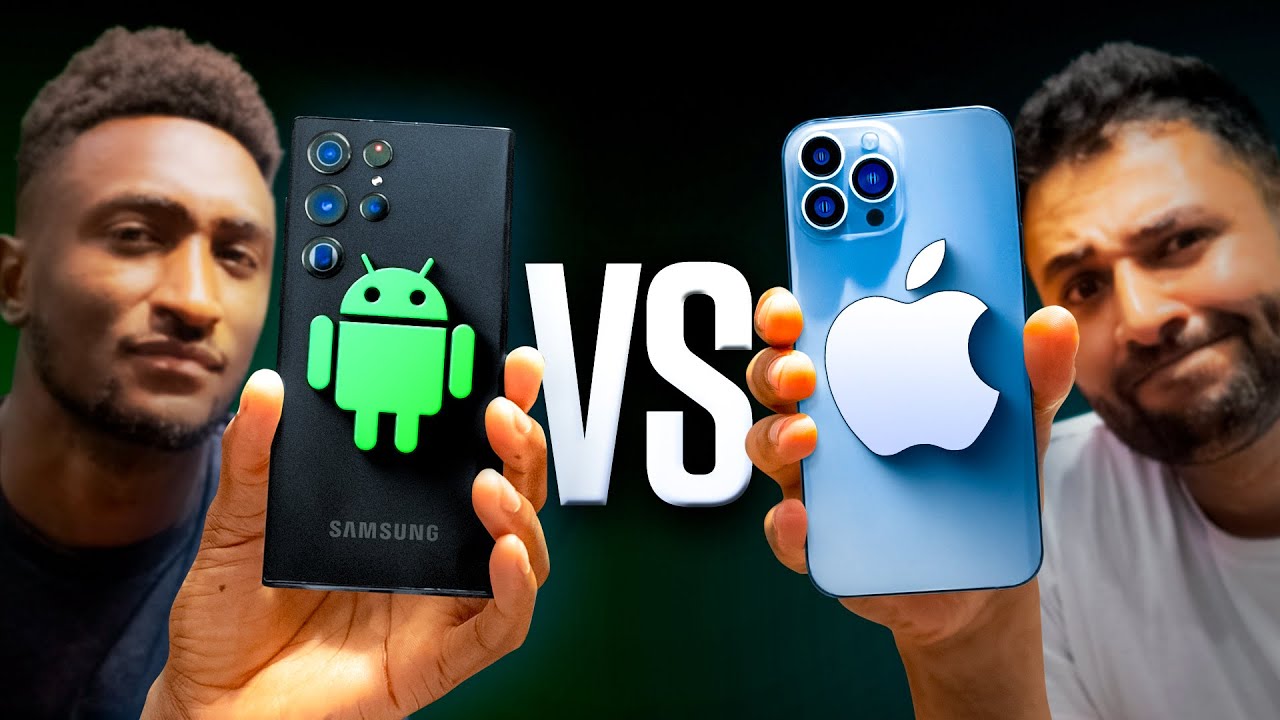Iphone vs ndroid

In the vast universe of smartphones, two titans reign supreme: iPhone and Android. The perennial debate over which is superior has fueled countless discussions, comparisons, and even sparked fierce loyalty among users. But in a world where both platforms offer exceptional features and functionalities, how does one decide? Let’s delve into the realms of iPhone and Android, exploring their unique characteristics to help you make an informed choice.
Design and Build:
One of the first impressions a smartphone leaves is through its design and build quality. iPhones are renowned for their sleek, minimalist aesthetics and premium build materials. From the iconic glass backs to the precision-engineered aluminum frames, iPhones exude elegance and craftsmanship. On the other hand, Android offers a diverse range of designs catering to various preferences. From the avant-garde designs of Samsung’s Galaxy series to the rugged durability of phones like the Google Pixel, Android devices provide a plethora of options to suit different tastes and lifestyles.
Operating System and User Interface:
At the heart of every smartphone lies its operating system (OS) and user interface (UI), dictating how users interact with their devices. iPhones run on iOS, Apple’s proprietary operating system celebrated for its intuitive interface, fluid animations, and seamless integration with other Apple devices. iOS prioritizes simplicity and consistency, making it ideal for users who value a polished and user-friendly experience. On the flip side, Android boasts a more customizable and adaptable environment. With its open-source nature, Android allows users to personalize their devices extensively, from tweaking system settings to installing third-party launchers and widgets. This flexibility appeals to tech enthusiasts and power users who crave control over every aspect of their smartphone experience.
App Ecosystem and Integration:
The app ecosystem plays a crucial role in the overall smartphone experience, determining the availability and quality of applications on a given platform. iPhones have long been praised for their thriving App Store, which houses a vast array of high-quality apps optimized for iOS devices. Apple’s stringent app review process ensures that apps meet strict quality standards, resulting in a curated selection of software that enhances the user experience. Android, on the other hand, boasts the Google Play Store, which offers a similarly vast library of apps catering to diverse interests and needs. While the Play Store may have a slightly more relaxed app approval process, it provides developers with greater freedom to experiment and innovate, resulting in a dynamic ecosystem of apps and services.
Integration with Ecosystem:
For many users, the smartphone serves as the hub of their digital lives, connecting seamlessly with other devices and services. iPhones excel in this regard, thanks to Apple’s ecosystem of products and services. From the seamless integration with MacBooks and iPads to the convenience of iCloud for storing photos, videos, and documents, iPhones offer a cohesive ecosystem that enhances productivity and convenience. Android devices, while not as tightly integrated with other platforms, still offer robust connectivity options. Google’s suite of services, including Gmail, Google Drive, and Google Photos, seamlessly sync across Android devices, providing users with a unified experience across multiple devices.
Security and Privacy:
In an age of increasing digital threats and privacy concerns, security is paramount when choosing a smartphone. iPhones have long been lauded for their stringent security measures, including regular software updates, sandboxed apps, and robust encryption. Apple’s commitment to privacy is evident in features such as Face ID and Touch ID, which securely authenticate users without compromising their personal information. Android, while historically perceived as less secure, has made significant strides in bolstering its security architecture. With features like Google Play Protect and timely security patches, modern Android devices offer robust protection against malware and cyber threats. Additionally, Android’s open-source nature allows for greater transparency and community-driven efforts to identify and address security vulnerabilities.
Conclusion:
In the timeless clash of iPhone vs. Android, there is no definitive winner. Both platforms offer unique strengths and cater to different preferences and lifestyles. Whether you prioritize elegant design and seamless integration (iPhone) or customization and flexibility (Android), the choice ultimately boils down to your individual needs and preferences. So, whether you pledge allegiance to the Apple ecosystem or revel in the freedom of the Android universe, rest assured that both platforms offer a world of possibilities at your fingertips. Choose wisely, for your digital companion awaits.





